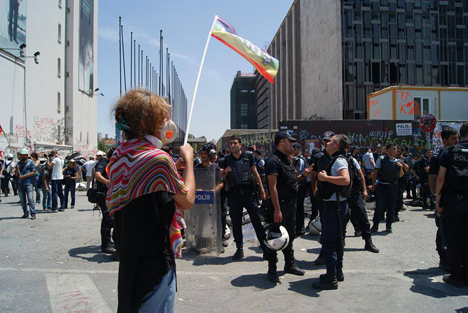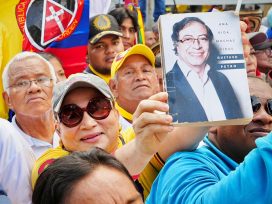
France risks becoming ungovernable. While Macron’s autocratic style is much to blame for the current impasse, the fundamental problem lies in the development of the parties and party elites.
Leave identity-based politics behind and identity-based life aside and, instead, evolve towards pluralistic policies focused on the issues: this is the lesson that Nil Mutluer draws from an in-depth analysis of the role of laicité in Turkish society up to and around the Gezi Park protests.
Although the Gezi Park resistance began as a protest against plans to demolish the park and uproot some of its trees, it turned into a demonstration encompassing many types of dissent against the government from 31 May onwards. It evolved into a movement in which people from all over Turkey voiced dissent on a variety of subjects, from restrictions on ways of life to local administration, the construction boom and problems in the judicial system. The event led to the reappearance of many concepts that have been frequently used in political life, one of which is laicité.

Taksim Square in Istanbul on 12 June 2013.Source:Supportgezi on Facebook
As a political concept, laicité is a method of organization in which no faith can be superior to another. A laic system operates at arm’s length to all faiths, enabling them to be debated on philosophical or religious grounds, and allows all religious groups to associate freely, regardless of the demographics of the majority. This implementation of laicité also means that the judicial system remains at an equal distance to all citizens, guaranteeing freedom of expression, thought and belief.
In the Turkish case, however, laicité has been the reference point around which the nationalist state has validated its existence since the proclamation of the Republic. The concept is at the same time an identity that becomes manifest in the symbols of those associated with it, above all Ataturk. Therefore, laicité in Turkey refers to both a political concept or idea and an identity, and is present in the memories of the communities and individuals that constitute Turkish society, along with associated historical and political references and experiences.
Laicité in Turkey was reformed as a concept by the Republicans and remained important for the continuity of the dominant system, under which the Sunni Muslim Turks living in Turkey became the principal citizens, and members of the Christian, Jewish and other faiths constituted minorities. While the Alevi citizens were not classified as minorities, they were subject to discrimination and assimilation in every respect, from education to worship. The Office of Religious Affairs, established to serve Sunni Muslims only, at times ordered nationalist political messages to be read from mosque pulpits. Some believers who were barred from practicing their faith in a manner of their own choosing were also discriminated against. In the martial courts, known as Independence Courts (Istiklal Mahkemeleri), set up after the War of Independence to eliminate counterrevolutionary and anti-republican elements, such believers of Islam as well as those of other faiths were also tried and executed. A public ban on Islamic headscarves meant some women were excluded from many areas, including education, business and politics. The military coups of 1960, 1971 and 1980 all reinforced the sovereign nation-state. During the military intervention on 28 February 1997, further steps were taken towards eliminating those who refused to conform to government-backed ways of thinking, worship and appearance.
In short, laicité became a concept that drew a red line around republican principles. While laics were mobilized by the state to protect the values of the Republic, Muslims who were critical of this form of laicité were branded reactionaries. It is important to grasp this molding of laicité into an identity in order to understand the polarization experienced in Turkey today.
It was in this context that the Justice and Development Party (AKP) came to power. In direct opposition to the Republican understanding of laicité, they posited democracy as a concept and religiosity as an identity. Although democracy, religiosity and laicité do not necessarily exclude each other, an explicit opposition evolved in Turkey due to the political baggage attached to these terms. Those defending “laicité” were placed in the Republican camp, and those who spoke of “democracy” were often considered AKP partisans.
During the AKP’s ten-year reign, the Republican People’s Party (CHP) exacerbated matters further by leveraging the existing usage of the concept of laicité as an instrument of the status quo to promulgate a new idea of nationalism. The alternative would have been to reform the concept in order to make it more pluralistic and inclusive. But instead of interpreting the dynamics of change in society and creating room for political demands, the CHP increasingly turned inwards, opening the way for the AKP to present itself as the champion of social transformation, consistently responding to the political and social needs of its electoral base.
However, in the absence of an effective opposition, the AKP chose to close up too and, after the 2007 electoral victory, pursued ever more conservative policies. Many political issues were couched in religious terms and integrated into a sustained nationalist discourse. For lack of alternative political contenders that might have forced the AKP to become more pluralistic, the AKP’s conservative, democratic policies tended to homogenize the heterogeneous composition of its electoral base.
It was precisely at this point that the AKP made a crucial mistake. In a move that echoed the way in which previously Republicans were unable to understand the Muslim population, it was unable to understand the plurality within the laic population and foresee its reflexes. As it consolidated its position of power, it adopted the same understanding of government that it had once complained bitterly about, and appropriated its institutions, with the Office of Religious Affairs being a case in point. On the basis of this organizational structure, it hardened its policies. For example, its discourse on the Kurdish issue might have been moderate compared to its predecessors, but the AKP had not take any positive steps until the recent peace process commenced. This is the context in which the Gezi Park protests broke out.
The events at Gezi Park turned all eyes to the laic segment of the society, their reflexes, and the significance of laicité in general. Much is being written about this. Some argue that laicité is a stagnant structure and its children are “bohemian, bourgeois masses” that cannot say anything new politically. Others assert that this is a new era. Since both approaches are arguments that have been fed by excluding “the others”, whether it be laics or the religious, they can only tell part of the story of the group whose laic reflexes sprung into action in Gezi Park.
The Gezi Park protests began as the movement of a small pluralistic, environmentalist and libertarian group, but police brutality led to the sudden adoption of the movement by a segment of the population who felt excluded by the polarizing discourse of the AKP, which cast them as “laic CHP supporters” who were against the “democratic AKP”, but would in fact not vote for the CHP as a bloc. The silence of the mainstream media, contrasted with the live depiction of brutality on social and alternative media channels, also pushed people frustrated by the lack of space in which to express their views in such a polarized climate out onto the streets; with young and critical people, who had not seen another government since their childhood and thus stood at a distance from the culture of subservience, leading the movement.
Although the initial group of people were non-nationalist and non-sexist libertarians who were much removed from the ideological substructures of old, the crowds that poured into the streets presented a nationalistic image: alongside groups that took part in the resistance with Kemalist and militarist references, some people were out there with their flags for lack of another political reference. There had never been an ideology outside the framework of nationalism – that is, a framework that started with primary school – and the government had polarized society between laicité and Islamism; meanwhile, the political opposition was not able to provide an alternative language to those who associated themselves with laicité. So people who went out to demonstrate in the streets at first turned to their flags. Kurdish, Muslim, feminist and LGBT groups took their places alongside nationalists. The defining characteristics of the group were their youth and disorganization.
The administration escalated the matter by emphasizing the significance of its majority backing and by marginalizing the CHP. Although the laic segment had a pluralistic composition – in terms of the motive and content of the resistance – despite the ubiquitous appearance of the national flag, the AKP’s discourse hoped to keep alive the negative image of laicists in the minds of its constituency, even as the protests grew. First they attempted to position demonstrators as the supporters of a civilian coup and made associated references to the military intervention of 28 February 1997. They then repeatedly claimed that some protestors were seen drinking alcohol in the Dolmabahçe Mosque, where they had sought shelter from police violence, despite the fact that the imam of the mosque himself contradicted this allegation. The prime minister kept reminding people of the executed prime minister Adnan Menderes and the allegedly assassinated president Turgut Özal, the purpose being to evoke the feeling of victimization in the minds of the religious population. Meanwhile the government also embraced nationalism, pushing the CHP into the laic-nationalist camp, and thus appealed to the followers of the nationalist-Islamist tradition. Today, the AKP continues along this route of polarization.
In today’s Turkey, it is clear that laicité is no guarantee of freedom of faith, but a political concept and an identity that has been instrumentalized in order to create polarization. However despite attempts to create opposing poles of laicists and democrats in society, there are no clear boundaries and homogeneous structures. Just as religious people who identify politically with the AKP do not make up a homogeneous bloc, the laic groups also lack homogeneity. The concept laicité has to be redefined in a way that incorporates the religious as well; only then can it really function as a guarantee of freedom of faith and expression. But merely redefining a concept will not be enough. Implementing policies properly and coming to terms with the past are equally important. Just as the administration has to leave the polarizing discourse aside, the laic population must reconcile itself with its past and purge laicité of its nationalist references. This is needed not only so that those who position themselves as laic or religious are able to understand each other, but also to create a mindset that will be conducive to the end of the civil war-like atmosphere that has already characterized Turkey for years. The ability to break the spiral of otherness surrounding identities such as Kurd, Armenian, Alevi, Greek, gay or woman, and to respond to events based on the issue at hand is essential to rebuilding justice. We must leave identity-based politics behind and identity-based life aside and, instead, evolve towards pluralistic policies focused on the issues.
Published 9 August 2013
Original in Turkish
Translated by
Sila Okur
First published by Varlik 7/2013 (Turkish version); Eurozine (English version)
Contributed by Varlik © Nil Mutluer / Varlik / Eurozine
PDF/PRINTSubscribe to know what’s worth thinking about.

France risks becoming ungovernable. While Macron’s autocratic style is much to blame for the current impasse, the fundamental problem lies in the development of the parties and party elites.

Elected in 2022 on a wave of popular hope, Colombia’s leftwing leader Gustavo Petro has failed to negotiate peace with the country’s armed groups and embarked on a ruinous tariff war with Donald Trump. A portrait of the president hampered by his own revolutionary nostalgia.